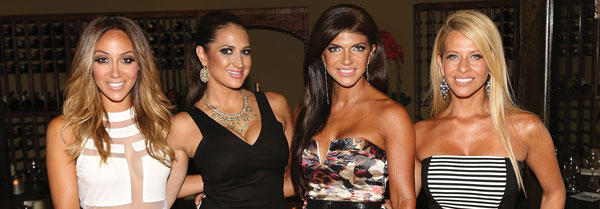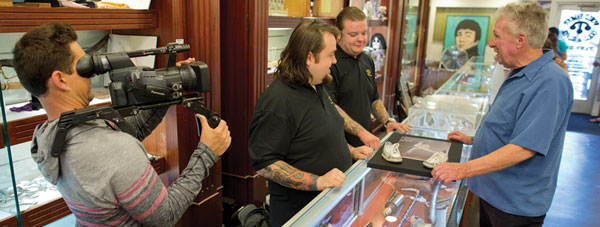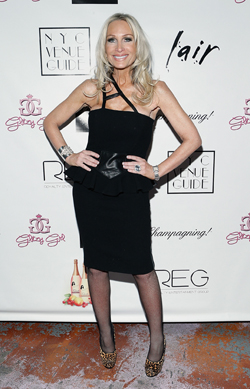Cover Story
Posted Dec 01, 2014 04:00 am CST
By Lauren Etter

Photo of Kim Kardashian by Reuters/Gonzalo Fuentes
Last year, Kim DePaola of the
Real Housewives of New Jersey was hosting the grand opening of her designer dress shop when a brawl broke out. One of the guests got punched and then nailed with a stiletto heel, leaving a bloody gash on his forehead.
In true reality TV fashion, the cameras kept rolling, capturing all the gory details of the unfolding drama. The man who was hit with the shoe later filed a lawsuit, claiming that the brawl was staged by the show to amp up the drama.
"This was something that was done for a reality show gone awry," the man's attorney, Nicholas Sekas, told a New Jersey newspaper. "It was done for a ratings grab."
The lawsuit settled.
While reality television on-screen may often seem devoid of substance, the legal inner workings behind the scenes are anything but.
Lawyers touch nearly every aspect of reality TV production, from the mundane-vetting ideas, acquiring talent, negotiating contracts and ensuring a safe se t—to the juicy—keeping talent from leaking plots, preventing producers from rigging contests and going to bat for celebrities who relish filing lawsuits to grab headlines.
And business is booming for lawyers who specialize in this once niche area of television programming.
"If you just look through any channel guide, you'll see how many networks that air nonscripted programming there are now," says Brian Raymond, an entertainment attorney who specializes in reality television at his Los Angeles-based firm, Raymond Legal. "I certainly don't see it going away anytime soon, and for my own benefit I hope it doesn't.
Reality TV is experiencing a golden era. The format has evolved from the advent of Candid Camera in the 1940s to Unsolved Mysteries in the '80s, to MTV's Real World in the '90s and then Survivor, which first aired in 2000. Since then the genre has taken off. Today every facet of life—ordinary or ot herwise—is game for a reality series. There's Keeping Up with the Kardashians, The Bachelor, The Biggest Loser, America's Next Top Model, Survivor, Pawn Stars, Jersey Shore—the list goes on and on into the dozens, if not hundreds. (Attention, lawyers: U.S. production company GRB Entertainment is on the hunt for an "everyday attorney" to host a new legal reality show.)
The proliferation of reality TV is partly a function of taste. Americans love peering into the private lives of others and seeing a good conflict. It's also partly a function of necessity. The cost to produce an hourlong reality show is a fraction of the cost of a scripted cable show, and the ratings are often higher. "If you can make a show like Jersey Shore that gets as much ratings as scripted television that is five times more expensive to make, then you've hit the jackpot," Raymond says.
There are several genres of reality TV. Well-known docudramas, like the various Real Housewives shows or Jersey Shore, often have at least some element of staging, with writers shaping the story's overall arc. And then there are shows, like Cops, which follow a less structured format and generally have no scripting whatsoever (although there have been some famous court cases challenging the authenticity of shows purporting to be unscripted).
In those shows, "the only time the camera guys are supposed to be involved is if it's a matter of life and death," says Ethan Bordman, an entertainment attorney based in Ridgewood, New Jersey. And then there are the competition shows, including The Amazing Race, Chopped and Top Design. Generally these shows have people competing in various feats involving physical stunts, intellectual challenges and artistic pursuits.
Increasingly, there are hybrid shows that take the traditional unscripted forma t and combine it with an element of competition. Survivor is a classic example. So is the popular show Big Brother, in which "houseguests" live together and compete for a cash prize awarded to the last person who avoids "eviction."

Photo of The Real Housewives of New Jersey by Manny Carabel/Getty Images
LEVELING THE PLAYING FIELD
While attorneys are involved in all types of shows, they are especially needed for those based on a competition. They watch over the game to ensure that the rules are fair and that the set is liability-proofed, because many competition shows have contestants performing strange, often death-defying, feats. "You've got producers there that are trying to make the best dramatic and most compelling program as possible," Raymond says. "With that, there's certainly the opportunity for their eye to fall off the actual fairness of the contest, and even I suspect there's the possibility—although I've never witnessed it—of producers faking or rigging a contest in order to have the best dramatic TV result."
Raymond recently found himself on the set of The Great Escape, a now-canceled reality show that involved teams competing to be the first to break out of unusual settings, such as the former federal prison on Alcatraz Island. Along the way, contestants had t o endure a series of challenging mental and physical obstacles. The winners took home a cash prize of $100,000. During the taping of one episode, Raymond climbed aboard an aircraft carrier and walked the entire course with a producer before the contest began. That took him to the ship's brig, from which contestants were supposed to escape to a ledge on the vessel where a giant box was to be hoisted up, and finally to the side of the ship where contestants would rappel down nearly 200 feet into a small boat.
"I visualize myself basically playing the game," Raymond says. "Looking at each location, saying, 'OK, they've got this there.' " I carry around measuring tape with me and pen and paper."
When production attorneys arrive on the set, they're often seeing for the first time how the set is designed for a particular competition. That means they may get there and realize some of the rules quickly need to be changed.

Photo of Jerry Glover by Nima Taradji
Jerry Glover, an entertainment attorney at Leavens, Strand & Glover in Chicago, has represented reality television producers like NBC Universal and Warner Bros. Television. He once worked on the set of a show where contestants had to perform stunts inspired by scenes in famous Hollywood movies. In one competition, the stunt was based on a scene in the movie
Fargo, in which Frances McDormand plays a cop catching the bad guy feeding a dead body into a wood chipper. In the competition, the producers set up a wood chipper and instructed the teams to have one player feed big hunks of red meat into the chipper while another stood on the other side holding a basket. The team that caught the most shredded meat by weight in their basket won.
When Glover arrived on the set, he noticed that the placement of the wood chipper among the trees was problematic.
"The trees would actually be catching most of the meat," he recalls.
Quickly, he and the producers had to twe ak some rules. They ended up changing the angle of the chipper "spew" to avoid the trees. Also, with safety in mind, he recommended that the contestant with the basket stand farther back than originally projected "because of the potential liabilities associated with the wood chipper itself going crazy. It was a large contraption—much larger than I expected it to be."
Fairness on these competition reality shows is taken very seriously. In fact, ensuring the integrity of a game or contest is one of the biggest jobs for reality TV attorneys. That's because there is a federal law that makes it a crime to rig a game show.

Photo of Survivor's cast and set by Timothy Kuratek/CBS via Getty Images
THE QUIZ SHOW SCANDAL
The law dates to the 1950s, after it came to light that some of the era's most popular shows, including
The $64,000 Question and
Twenty-One, had been rigged in a bid to boost ratings. In some instances, producers prepped contestants by giving them answers and coaching them on how to act to conceal the deceit.
Eventually the truth came out, and it prompted widespread public outcry. Congress held hearings into the "quiz show scandals" and eventually passed an amendment to the 1934 Communications Act to outlaw rigging or unfairly affecting the outcome of a game or a competition show. (For more, see Precedents: "Quiz Show Hearings Begin.")
In general, the statute rests on the idea that the program being called into question is not simply a contest, but a very specific type of "bona fide contest" that hinges on "intellectual knowledge, intellectual skill or chance," according to the law, 47 USC § 509. That typically applies to traditional game shows or quiz shows, such as Jeopardy or Who Wants to Be a Millionaire.
The law has rarely been invoked since the '60s, and when it is the cases often settle out of court. That has led to uncertainty as to exactly how or whether the statute applies to reality TV.
In 2001, a contestant on Survivor invoked the quiz show statute, saying that producers intervened in the voting process, resulting in her being voted off the show instead of a competitor who she says was favored to keep ratings high. The case settled.
A more recent case involved Storage Wars, the reality show that chronicles professional buyers who bid on abandoned storage lockers at auctions and then flip their contents. Last year a star of the show, David Hester, sued A&E Television Networks and the show's producers, claiming that producers "salted" the storage lockers with valuable goods to increase the drama of the show.
"Although the series is in tended to be a truthful 'reality series' depicting people bidding at auctions of abandoned storage lockers, A&E has committed a fraud on the public and its television audience in violation of the Communications Act of 1934, which makes it illegal for broadcasters to rig a contest of intellectual skill with the intent to deceive the viewing public," according to the suit, which was recently settled.
Kimberlianne Podlas, an attorney and professor of media law and pop culture at the University of North Carolina at Greensboro, says the quiz show statute likely doesn't apply to most modern reality shows. "We're not back in that quiz show era," she says. "There are so many no-skill, nonintellectual components that a lot of the competition shows don't fit into the quiz show statutes anymore."
Either way, producers and networks aren't taking a chance. Oftentimes, to doubly ensure there is no question of fairness, producers will hire a "compliance expert " to work on the set. This person can be a lawyer, but often is not.
Alan Gerson, president and CEO of Enteractive Solutions Group, is a former practicing attorney. A division of ESG, the Sullivan Compliance Co., provides advice on major game and reality competition shows, including Wheel of Fortune and Jeopardy.

Photo of Pawn Stars on set by Associated Press
THE ART OF FAIRNESS
Gerson's Burbank, California-based company makes sure that the shows aren't rigged, and that everyone is attempting to produce them in the most equitable fashion possible. In many cases, compliance experts actually help write the rules with the producers.
"We tell [participants] it is a crime for anybody to ask you to do anything that would be unfair or dishonest," he says. "You need to tell us in case you are approached by anyone asking you to do anything that is untoward."
The Sullivan Compliance Co. recently was on the set of the Food Network's Cupcake Wars, where contestants vie for a prize of $10,000 in a series of bake-offs. SCC addressed many aspects of the show's fairness, ensuring that the contestants were of a similar baking skill level, that the time allotted to bake and decorate the cupcakes was sufficient, and that the judges were qualified.
From the standpoint of producers, Gerson's a good guy to have on their side. "Most of th ese things don't go to court," Gerson says. "You might think that you were treated unfairly, but oftentimes we are able to convince the contestant that under the rules and after reviewing the videotape they were not in fact treated unfairly."
Attorneys are critical to the reality show business in many other ways as well. For example, a common role for production counsel is to make sure that the talent doesn't leak any information about the shows, because most shows are taped in advance. Leaking "would destroy the commercial value" of the show, Glover says. "Especially if one winner is chosen—to reveal who the winner is would destroy any reason for somebody to broadcast the show or for somebody to watch it."
There have been several high-profile lawsuits that touch on whether those who leak "spoilers" should be held legally liable. In 2011, the producers of The Bachelor sued the proprietor of a popular website called Reality Steve, whose pr incipal purpose was to leak plotlines before they aired on a variety of shows, including Jersey Shore and Survivor. The suit alleged that Reality Steve fraudulently induced contestants to breach their confidentiality contracts by offering them money to dish secrets.

Photo of Kim DePaola by John Lamparski/WireImages
THE $100 MILLION IDEA
The rise of reality TV has also spawned an entirely new breed of television stars—including Snooki, Honey Boo Boo and the Robertson family from
Duck Dynasty—who have become famous for no other reason than simply appearing on one of these shows. This new class of "talent" has shaped how networks draft their contracts.
Increasingly, networks and production companies are claiming they deserve a cut from whatever fame their cast members achieve. For example, after Bethenny Frankel appeared on The Real Housewives of New York City she went on to found the Skinnygirl Cocktails business, write several books and host her own talk show. She reportedly sold her cocktail company for more than $100 million.
"Production companies are saying if we put you on the show and you end up doing an endorsement deal or write a book, we're going to participate in your windfall of revenues," Raymond says. "If the network's going to be paying $3 million or more to be producing a show and provide a platform and essentially a commercial for you or your business, it makes sense for the networks to want to get a part of that."
Being a lawyer to the reality biz requires a special type of personality. While serving as an on-set attorney for one of these shows may seem exciting, it also involves a lot of hard work. On-set attorneys are often the new guys on the scene. That means they have to deploy a lot of diplomacy and grace so as not to ruffle feathers while doing their job.
"You have to very much read and navigate personalities and egos, and be very flexible," Raymond says.
Glover echoes that sentiment.
"You've got to get along with the crew just to get the job done," he says. "When you get on set, immediate stereotypes set in, like you're there just to say no. You've got to get around those stereotypes. When you are on set, it's up to you to make them realize that you are one of them. Because you are. Y ou're there to do the same thing they are—get a show on the air."
Lauren Etter is a freelance journalist based in Chicago.
This article originally appeared in the December 2014 issue of the ABA Journal with this headline: "The Lawyers of Reality TV."








































 Despite our reputation for being about as monogamous as rabbits, straight people are constantly seeking relationship advice from gay men.
Despite our reputation for being about as monogamous as rabbits, straight people are constantly seeking relationship advice from gay men.








